Thomas Archer - an Eccentric Man from Guilford County, NC
Who Ended Up With 640 Acres from Military Bounty Land Warrant #2344
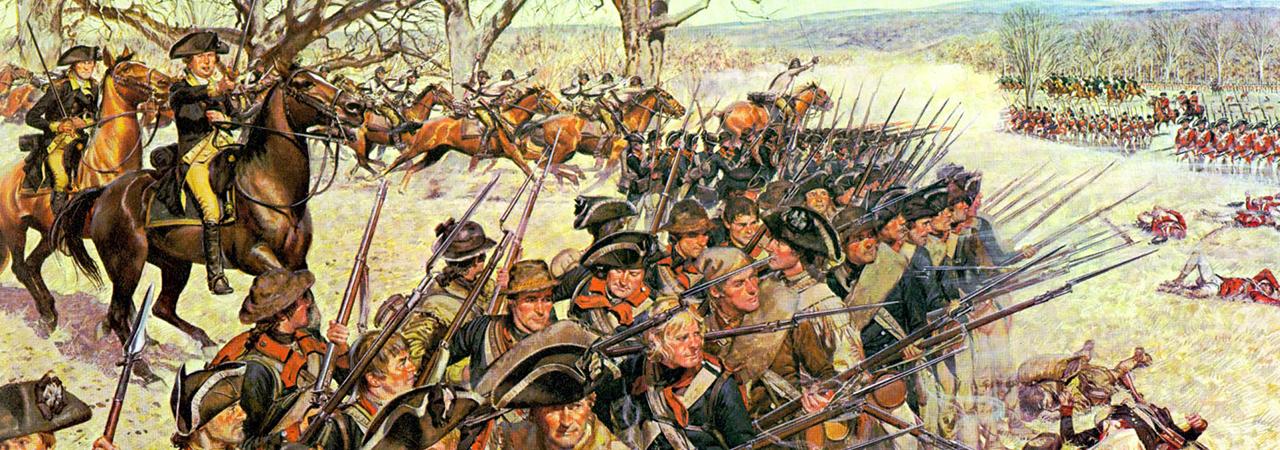
This is #3 in a sequence of 3 articles. You should read the first two articles before reading this one.
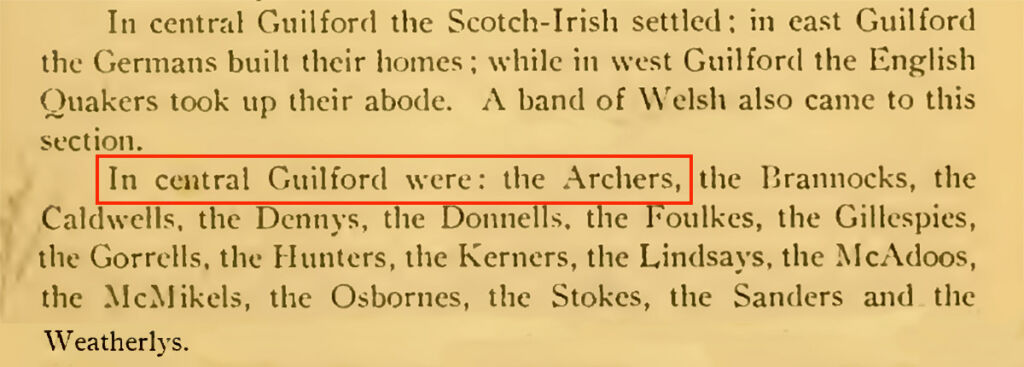
The area of the North Carolina Piedmont that became Guilford County was largely settled by three groups: “In central Guilford the Scotch-Irish [Presbyterians] settled; in east Guilford the Germans [Lutherans and Reformed mainly] built their homes; while in west Guilford the English Quakers took up their abode.”[i] The Archer family was a part of the Scots-Irish group, as were the McKemies and Hayses and many other families they closely associated with. James Archer was one of the early Scots-Irish settlers in the area, having settled on Horsepen Creek (a tributary of Reedy Fork) in or before 1765. One of his sons was Thomas.[ii]
[i] Sallie W. Stockard, “The History of Guilford County, North Carolina. (Knoxville, TN: Gaut-Ogden Company, 1902), 13.
[ii] S.M. Rankin, History of Buffalo Presbyterian Church and Her People. (1934; reprinted, New Delhi, India: Isha Books, 2013), 39.
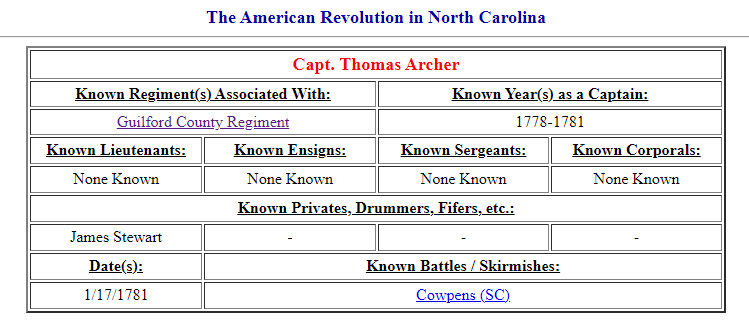
Leave It to Thomas Archer
Evidently, Thomas Archer was quite a character. An event that occurred in 1779 during the American Revolution says a lot about him. Guilford County was a hot bed of conflict between Whigs (American Patriots) and Tories (British Loyalists) during the war. Tories were especially numerous in the southern part of Guilford.[i] “As many citizens were British sympathizers as were Whig proponents.”[ii] It was neighbor against neighbor in many cases and, much like the Civil War nearly a century later, local hostilities were often heartless and brutal as the following incident illustrates:
[i] Rankin, 182.
[ii] Hughes, 105.
In the summer of 1779, two armed Tories, Hugh McPherson and one Campbell, from Moore County, appeared at William Brazelton’s door [in Guilford County], to surprise and capture Brazelton. Unknown to the intruders, Brazelton was not alone—a militia meeting was in progress in the house, with all of the company officers present as well as Brazelton and William Gipson of South Carolina. As he came through the door, McPherson was knocked to the floor by Risdon Moore, and both men were captured.
The two prisoners were marched to Guilford Courthouse. There the capturing force formed a courts martial of themselves and tried both men. McPherson was found guilty and executed by shooting. Campbell was found less guilty than McPherson and was subjected to different treatment. A spike was driven into a log, sharpened to a point. Then Campbell was stood upon the spike and rotated until the spike pierced his shoe and passed through his foot. Then he was removed from the spike and released. Campbell was rotated by Thomas Archer, a militiaman living near the courthouse.[i]
[i] Hughes, 39.
Thomas Archer - Local Mythical Hero
Thomas Archer was a local hero in Guilford County, seemingly of mythical proportions in his day. The following incident occurred about a month prior to the Battle of Guilford Courthouse which occurred on March 15, 1781.
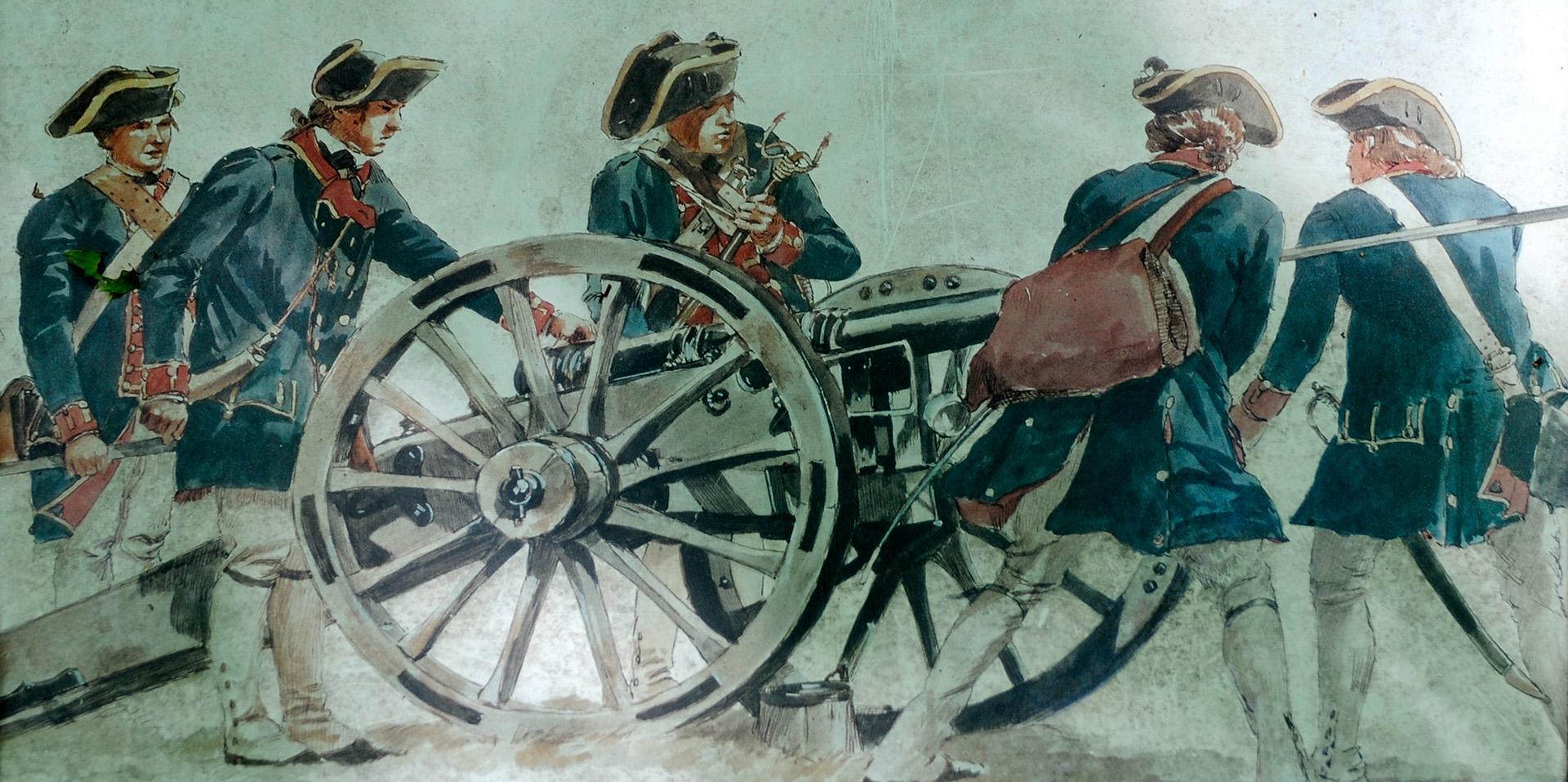
Tarleton [British Colonel] says that, “on the road many skirmishes took place between the British and the American light troops;” and it is said by others that they seldom shot at each other except across a turn in the road or when crossing a stream of water, though they were often in sight and sometimes within a rifle shot. Occasionally, however, when the British were pressing too closely on them, they found it necessary to skirmish a little; and in such cases, as Williams [Benjamin Williams, colonel over the North Carolina Regiment], was on the retreat, he could generally select his own ground. On one occasion of this kind, according to favorable tradition, having drawn up the whole of his men in a position, he made show of fight, and appeared very determined on making a stout resistance. The British, thinking they had not force enough to encounter him, sent back for two pieces of artillery and a reinforcement of men. In the corps of Williams was a singular genius, by the name of Tom Archer, from the north-west corner of Guilford county, who, with some others, had probably joined them at Martinville [county seat of Guilford at that time], for the occasion. He was not remarkable for strength of intellect, but had some other qualities which admirably fitted him for the ever varying scenes of that arduous and perilous march. Rather above the medium height and well proportioned, bony, muscular and vigorous, he was always in his place and always ready for service. Though constantly on fatigue and exposed every hour to the most imminent dangers, he never complained or became discouraged. Frank and open hearted, with a good share of ready wit, and a good flow of spirits, he was the life of his comrades, and contributed not a little to their patient endurance of the toils and perils of the march. Inflexible in his purpose, when he thought he was right, and enthusiastic in the cause of freedom, rough in his manners, blunt in his language and never caring whether he “murdered the king’s English,” and made “Irish bulls,” [ludicrous and logically absurd statements] all the time or not, he was ever ready to be on the “forlorn hope,” [military situation where the risk is extremely high, essentially a suicide mission] or take his turn at any kind of service. If to the above characteristics we add a great catfish mouth [wide mouth with down-turned corners], a big stentorian [booming] voice, and a bushy head of hair that would hardly thank you for a hat, you have Tom Archer before you as large as life; and probably the reader will think with the writer that, in some situations at least, such a man would be a very desirable friend; but, at all times a most undesirable enemy; or in other words, that he would, if not wronged or provoked in any way, be as clever a fellow as could be found in his sphere of life, ready to divide his last ration with a comrade or risk his life for a friend, but would “fight his weight in wild cats” before he would suffer any man or any set of men to trample on his rights. Hunting had been his delight from the time he was old enough to “draw a bead;” and, with his fine rifle, which he always carried and always kept in good order, he hardly ever missed his aim at any distance within two hundred yards.
When the artillery was brought up to its position in the road, Archer stepped out into the middle of the road, directly in front of the guns, and hailed them at the top of his big, strong voice, “Hallow, there—Mister, I wish you would take that ugly thing out of the road, or it may cause some trouble yet before all is over;” and then turning his head over his shoulder, said, to an officer standing by, “Captain, may I shoot that cussed rascal? for he has no business there, no how.”
“No, said the captain, not yet—wait till they are ready to apply the match; for we want to detain them as long as we can.”
The enemy, of course, if they heard him at all, paid no attention, as they would take him for a drunken fool or some crack-brained mortal; but while the preparations were making—Williams bringing up and marshalling his men, and the British doing the same—Archer stepped to the side of the road and stood there leaning against a tree, resting his gun with the butt on the ground, and in perfect silence, as if in a “brown study,” [lost in thought or day dreaming] or anticipating the pleasure of the feat which he expected to perform, and keeping his eye steadily fixed on that “ugly thing,” in the road. He had full confidence both in the gun and in himself; and having now a good opportunity as he thought, he was anxious to make another trial. Fear, was a word which had no place in his vocabulary, and he was probably never more composed in his life, but waited for leave to shoot, with as much impatience as he ever waited for a fine buck to come along when pursued by the hounds. The time was short—a very few minutes; and when he thought they were nearly ready to apply the match, he stepped out into the middle of the road and hailed them again. “Hallo, there—Mister, I say you had better take that thing out of the road, or I’ll be hanged if I don’t shoot some of you.” Then turning to the officer, said as before, “Captain, may I shoot that cussed rascal now; for tellin’ don’t do him one bit o’ good?”
“Yes,” said the captain, “and as quick as you can, for we have no time to lose.”
Having got permission, he clapped his rifle up against the side of the tree and taking sure aim with the quickness of an experienced hunter, and at the distance of about two hundred yards, when the gun cracked, a “red coat” fell. Then vaulting into the saddle, they all dashed off at full speed; and being favored by a hollow or a turn in the road, they had just time to get beyond the reach of the grape shot before the “big gun,” was fired. By this maneuvering on the part of Williams the enemy were probably detained an hour or two, which was no small advantage to the retreating army.
The above anecdote I had, some years ago, from what I consider good authority, and the character or Archer is well known in this community. There are many yet living [in 1856] who, when they were young, were well acquainted with him and they all, when asked, gave me the same account. One old gentleman replied to my inquiry with a laugh, that he had just sense enough to be “fool hardy;” but then he went on to give me his character more seriously, which agreed perfectly with that given by many others. He had considerable military spirit and got some office, that of captain, or one of lower grade; but it was found that, with a courage that feared nothing, he lacked discretion.[i]
[i] Rev. Eli W. Caruthers, The Old North State in 176, Volumes I and II with INDEX. (1854 and 1856; reprinted, Greensboro, NC: The Guilford County Genealogical Society, 1985), 119-120.
Thomas Archer’s lack of discretion sometimes got him into trouble throughout his life, but it seems that he remained popular and well-liked in spite of his indiscretions.
During the 1780s and 1790s, Thomas Archer was mentioned as a defendant or plaintiff in Guilford County Court cases, approximately eighteen times. Three of those were “State vs. Thomas Archer” cases. The verdicts are often difficult to understand in the court abstracts, but it appears that he was guilty about two-thirds of the time he was involved in court cases.[i] For example, on May 17, 1784 “Thomas Archer who was Indicted for Retailing Liquors came into Court and submitted and was fined 10 [shillings].”[ii] A century or so later he would have been called a bootlegger. But, at that time, the stigma of bootlegging liquor was not nearly as scandalous as it came to be in later years. According to the Fred Hughes map of early Guilford County, Thomas Archer was a tavern keeper in the county.[iii]
[i] Greensboro Public Library, “Guilford Court Records, 1781-1790,” Colonial Court Records of Guilford County, accessed March 17, 2019, https://library.greensboro-nc.gov/home/showdocument?id=5580.
Greensboro Public Library, “Guilford Court Records, 1791-1800,” Colonial Court Records of Guilford County, accessed March 17, 2019, https://library.greensboro-nc.gov/home/showdocument?id=5579.
[ii] “Guilford Court Records, 1781-1790,” 102.
[iii] Fred Hughes, Guilford County, N.C. Map. (Jamestown, NC: printed by author, 1988), lower-right corner.
As was often the case in those days, men who were found guilty in court from time to time were also chosen to serve in very legitimate civil roles. Thomas Archer was often a juryman in the county court, a juror in the Salisbury Superior Court, a bondsman for defendants in court cases, an overseer of road projects, a county patroller in Captain McAdams District, and a tax collector in Mr. Caldwell’s District. The person who created endnotes for the 1780s Guilford County Court abstracts, noted this about Thomas Archer: “[This was] the same Thomas Archer who ran the pin through the foot of a Tory prisoner at Guilford Courthouse. A violent and sadistic, tax assessor what could be better.”[i] With a reputation like his, who would dare fail to pay their taxes!
[i] “Guilford Court Records, 1781-1790,” 320, 323.
Elizabeth Archer, sister of Thomas, married John Hamilton on October 25, 1774. John Hamilton* was a prominent civic leader serving in a variety of roles—County Commissioner, Justice of the Peace, Clerk of the Court, and Sheriff for Guilford County, a member of the North Carolina’s House of Commons, as well as a tavern owner near the courthouse in Martinsville. Apparently, John Hamilton used his offices for personal gain. He “had 33 land transactions before 1800, including eight grants of 1800 acres, plus half-interest in five others, for a total granted acreage of 1800 acres, plus land purchased from individuals.”[i] In August 1786, Thomas Archer brought a lawsuit against his highly-positioned brother-in-law and won the case.
[i] Hughes, 6-7.
The will of James Archer, father of Thomas, was proved in the August 1799 session of the Guilford County Court. Thomas received 70 shillings, which his father said was “besides what he has already had as part of my estate.”[i] James Archer and his wife, parents of Thomas, are buried in lost graves at the Buffalo Presbyterian Church, which they helped to found—the church that no doubt Thomas Archer grew up attending.[ii]
[i] “James Archer,” North Carolina Will Abstracts, 1799-1885—Guilford, Warren, Orange, Mecklenberg, Edgecomb Counties. (Will Book A-1, dated January 2, 1799; proved August Court 1799).
[ii] Raymond Dufau Donnell, Buffalo Presbyterian Church and Cemetery, Greensboro, North Carolina. (reprint, Forgotten Books, 2018), 72.
Perhaps it was the death of his father that precipitated Thomas’s move to Tennessee, to the land granted to “Daniel Haston” by warrant #2344 which he, Thomas Archer, bought from Thomas Hays. Thomas Archer died in 1818 in (what was then) Dickson County, Tennessee. As we saw in the previous chapter, Archer’s Grant #1490 land is now in the southeastern corner of Houston County, which was created partially out of Dickson County in 1871.
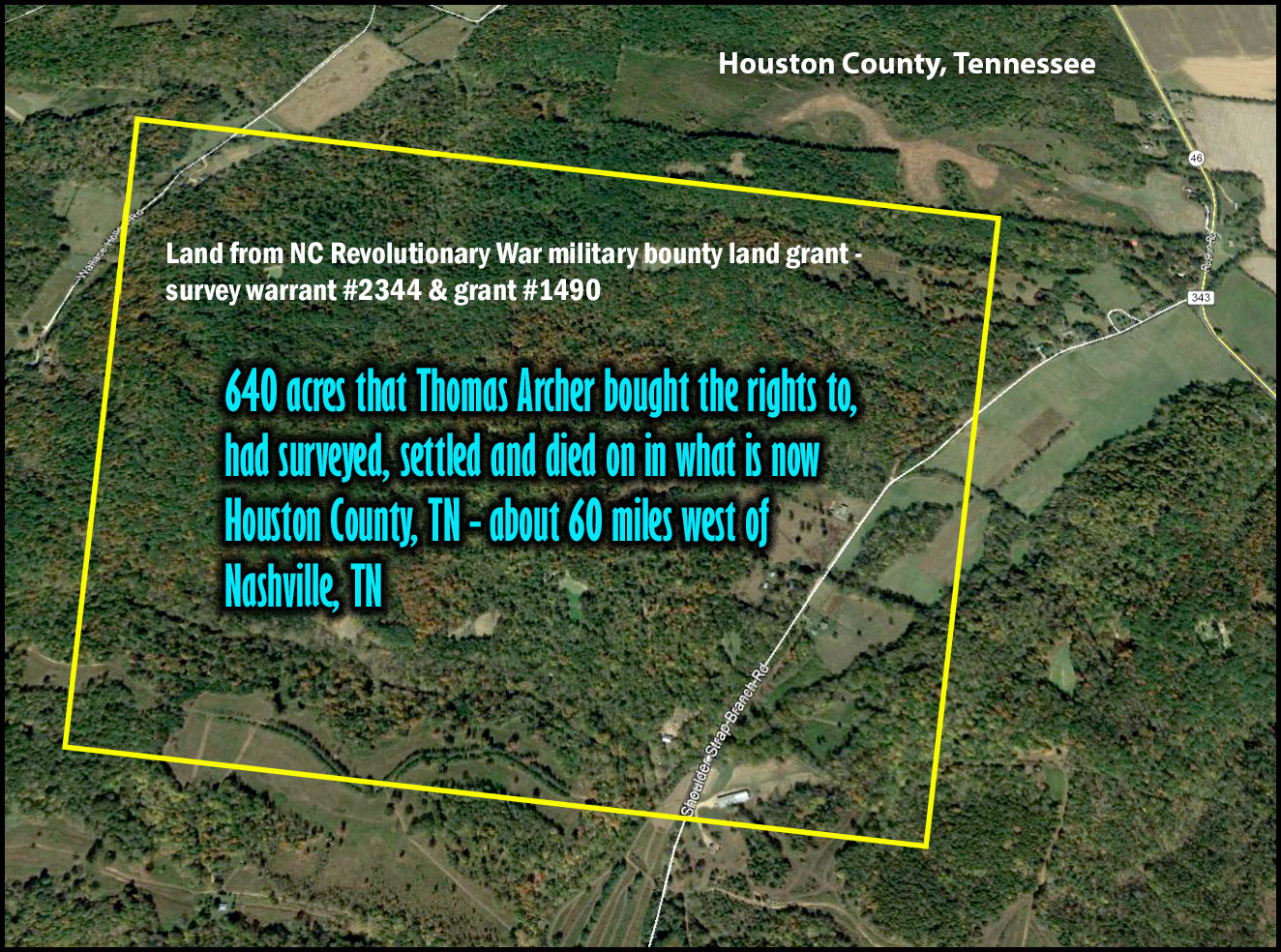
Questions and Hypotheses
Here is a question that haunts me: If the “Daniel Haston” warrant was a fraud and if Daniel’s name was assigned to it without him knowing about it, where did William Faircloth (or Thomas Hays) come up with the name “Daniel Haston”—a family name generally unknown in that area of North Carolina at that time? I can only speculate some possible answers to that question. Perhaps…
1. There was no fraud in the issue and assignment of warrant #2344 and “Daniel Haston” (our Daniel or another man by that name) did serve in the war, receive the warrant, and transfer it to Thomas Hays—everything was the way it would appear to have been. We examined the pros and cons of this possibility in a previous article. Or perhaps…
—–
2. William Faircloth, the former lieutenant in the 10th North Carolina Regiment, or Thomas Hays (or someone else at the Fairfield plantation) just created the name “Daniel Haston” out of thin air. The fact that the “Haston” family name in that area, at that time, was extremely rare if existent at all would make that unlikely. Or perhaps…
—–
3. One of these men knew, or knew of, Daniel Haston and simply stole his name without him ever knowing about it. If that was their mode of operation, they probably would have tried to pick someone whom they knew would never discover that his name was used fraudulently. And an English-illiterate German Virginian, just temporarily sojourning in Guilford County before moving into the trans-Appalachian wilderness, would have fit the bill nicely.
The third hypothesis may be the most plausible answer to my haunting question. And there is possible evidence to suggest that Daniel might have lingered for a short while in the Guilford County area prior to moving on to Tennessee—long enough to have become acquainted with someone who could have suggested his name to William Faircloth.
If you appreciated this article, please share it with others who might also enjoy it.

